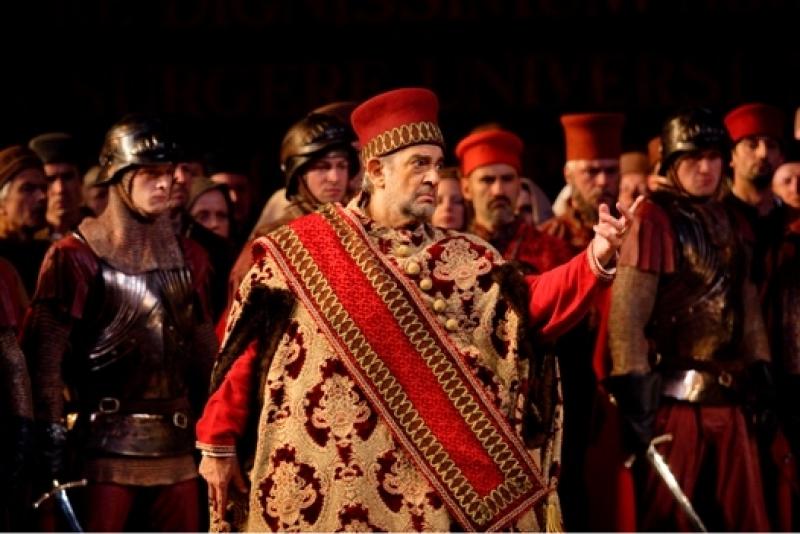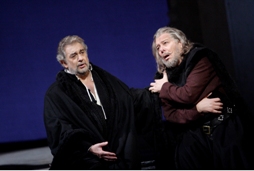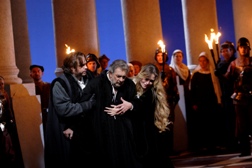Simon Boccanegra, Royal Opera House | reviews, news & interviews
Simon Boccanegra, Royal Opera House
Simon Boccanegra, Royal Opera House
Vocally authoritative as a baritone, Domingo can't fill the void in a frozen revival

 I'll admit that many of us were spoiled by the last revival of Boccane
I'll admit that many of us were spoiled by the last revival of Boccane
None of the other leads on this occasion was seriously below par, but none engaged in the crucial one-to-ones as had Lucio Gallo, Anja Harteros and Marcus Haddock back in 2008. If Maria Poplavskaya doesn't sort out her occluded sound soon, she'll either crash or become a mezzo - and not a Verdi mezzo either. Which would be a shame as she's always a sympathetic presence, comes closer to suggesting Boccanegra's 25-year-old virginal daughter than most sopranos to essay the part and actually produces some very stylish Italianate spinto lines in later scenes. Joseph Calleja is your stock stand-and-deliver tenor, with an unusual, slightly bleaty production but always a confident, ringing top. He and Poplavskaya never engaged - in fact no-one did - but sang well in the big Act One ensemble (Calleja and Poplavskaya pictured either side of Domingo below).
 Which is where the evening finally gathered some momentum. Moshinsky's murk, for all the monumental handsomeness of Michael Yeargan's designs, has given us no help in working out the background squabbles of Guelphs and Ghibellines, a fault in the shaky original libretto of 1857; but when Verdi drafted Boito in to write a new Council Chamber scene in 1881 just before their joint work on Otello, intelligibility rose a notch and the music reaches new, noble heights. Domingo, who sang well in the crucial father-daughter reconciliation of the previous scene but, with no help from the director, was the only Boccanegra who's failed to move me in this glorious duet, grasped the nettle in his one-man authority stunt. The big plea for peace between the warring Genoan factions, surprisingly well echoed by Poplavskaya's Amelia as very much her father's child, duly thrilled. And then Domingo pulled out new reserves of darker colour in the chilling threat to the depraved Paolo (Jonathan Summers, a Boccanegra of yore warning us what happens when a real baritone voice truly does wear and tear).
Which is where the evening finally gathered some momentum. Moshinsky's murk, for all the monumental handsomeness of Michael Yeargan's designs, has given us no help in working out the background squabbles of Guelphs and Ghibellines, a fault in the shaky original libretto of 1857; but when Verdi drafted Boito in to write a new Council Chamber scene in 1881 just before their joint work on Otello, intelligibility rose a notch and the music reaches new, noble heights. Domingo, who sang well in the crucial father-daughter reconciliation of the previous scene but, with no help from the director, was the only Boccanegra who's failed to move me in this glorious duet, grasped the nettle in his one-man authority stunt. The big plea for peace between the warring Genoan factions, surprisingly well echoed by Poplavskaya's Amelia as very much her father's child, duly thrilled. And then Domingo pulled out new reserves of darker colour in the chilling threat to the depraved Paolo (Jonathan Summers, a Boccanegra of yore warning us what happens when a real baritone voice truly does wear and tear).
After that later flourish, Verdi's opera-by-numbers in the second and third acts really needs to be kept afloat by the interaction of the four principals, which again it wasn't here. Only the sleep which follows on the heels of Boccanegra's knocking back a poisoned drink and the sea breezes which refresh his hour of death really hit the heights - partly by force of Domingo's sheer charisma when left to himself, partly by the incredible sensitivity to the high and low orchestral sonorities Antonio Pappano draws from the Royal Opera Orchestra. His is for the most part - with the exception of the big ensemble scene, superbly handled - an intimate account alert to every nuance in the score. If only it had a smaller-scale production to match. For once, the 'semi-staged' performance promised for the Prom on 18 July really ought to have the edge.
The future of Arts Journalism
You can stop theartsdesk.com closing!
We urgently need financing to survive. Our fundraising drive has thus far raised £49,000 but we need to reach £100,000 or we will be forced to close. Please contribute here: https://gofund.me/c3f6033d
And if you can forward this information to anyone who might assist, we’d be grateful.

Subscribe to theartsdesk.com
Thank you for continuing to read our work on theartsdesk.com. For unlimited access to every article in its entirety, including our archive of more than 15,000 pieces, we're asking for £5 per month or £40 per year. We feel it's a very good deal, and hope you do too.
To take a subscription now simply click here.
And if you're looking for that extra gift for a friend or family member, why not treat them to a theartsdesk.com gift subscription?
more Opera
 Tosca, Royal Opera review - Ailyn Pérez steps in as the most vivid of divas
Jakub Hrůša’s multicoloured Puccini last night found a soprano to match
Tosca, Royal Opera review - Ailyn Pérez steps in as the most vivid of divas
Jakub Hrůša’s multicoloured Puccini last night found a soprano to match
 Tosca, Welsh National Opera review - a great company reduced to brilliance
The old warhorse made special by the basics
Tosca, Welsh National Opera review - a great company reduced to brilliance
The old warhorse made special by the basics
 BBC Proms: The Marriage of Figaro, Glyndebourne Festival review - merriment and menace
Strong Proms transfer for a robust and affecting show
BBC Proms: The Marriage of Figaro, Glyndebourne Festival review - merriment and menace
Strong Proms transfer for a robust and affecting show
 BBC Proms: Suor Angelica, LSO, Pappano review - earthly passion, heavenly grief
A Sister to remember blesses Puccini's convent tragedy
BBC Proms: Suor Angelica, LSO, Pappano review - earthly passion, heavenly grief
A Sister to remember blesses Puccini's convent tragedy
 Orpheus and Eurydice, Opera Queensland/SCO, Edinburgh International Festival 2025 review - dazzling, but distracting
Eye-popping acrobatics don’t always assist in Gluck’s quest for operatic truth
Orpheus and Eurydice, Opera Queensland/SCO, Edinburgh International Festival 2025 review - dazzling, but distracting
Eye-popping acrobatics don’t always assist in Gluck’s quest for operatic truth
 MARS, Irish National Opera review - silly space oddity with fun stretches
Cast, orchestra and production give Jennifer Walshe’s bold collage their all
MARS, Irish National Opera review - silly space oddity with fun stretches
Cast, orchestra and production give Jennifer Walshe’s bold collage their all
 Káťa Kabanová, Glyndebourne review - emotional concentration in a salle modulable
Janáček superbly done through or in spite of the symbolism
Káťa Kabanová, Glyndebourne review - emotional concentration in a salle modulable
Janáček superbly done through or in spite of the symbolism
 Buxton International Festival 2025 review - a lavish offering of smaller-scale work
Allison Cook stands out in a fascinating integrated double bill of Bernstein and Poulenc
Buxton International Festival 2025 review - a lavish offering of smaller-scale work
Allison Cook stands out in a fascinating integrated double bill of Bernstein and Poulenc
 Tosca, Clonter Opera review - beauty and integrity in miniature
Happy surprises and a convincing interpretation of Puccini for today
Tosca, Clonter Opera review - beauty and integrity in miniature
Happy surprises and a convincing interpretation of Puccini for today
 Hamlet, Buxton International Festival review - how to re-imagine re-imagined Shakespeare
Music comes first in very 19th century, very Romantic, very French operatic creation
Hamlet, Buxton International Festival review - how to re-imagine re-imagined Shakespeare
Music comes first in very 19th century, very Romantic, very French operatic creation
 Falstaff, Glyndebourne review - knockabout and nostalgia in postwar Windsor
A fat knight to remember, and snappy stagecraft, overcome some tedious waits
Falstaff, Glyndebourne review - knockabout and nostalgia in postwar Windsor
A fat knight to remember, and snappy stagecraft, overcome some tedious waits
 Salome, LSO, Pappano, Barbican review - a partnership in a million
Asmik Grigorian is vocal perfection in league with a great conductor and orchestra
Salome, LSO, Pappano, Barbican review - a partnership in a million
Asmik Grigorian is vocal perfection in league with a great conductor and orchestra

Add comment